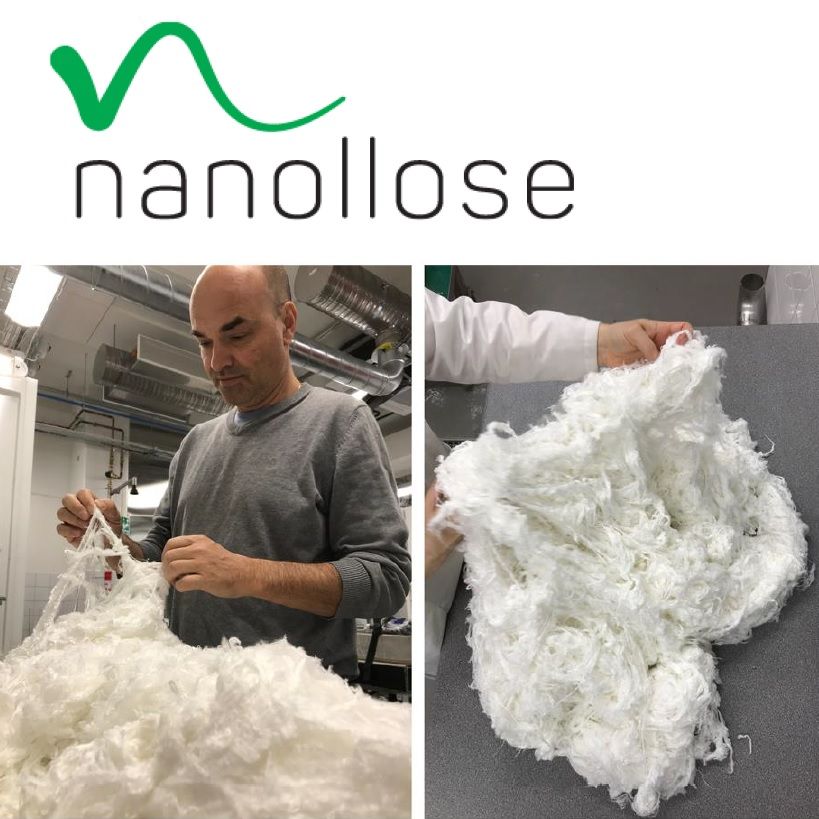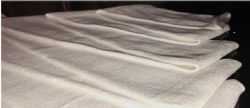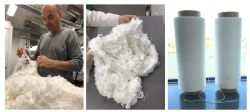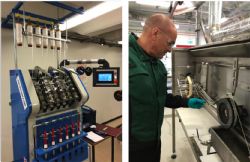 Successful Pilot-Scale Production of Fibre Leads to Groundbreaking Eco-Friendly Fabric
Successful Pilot-Scale Production of Fibre Leads to Groundbreaking Eco-Friendly Fabric
Perth, May 23, 2018 AEST (ABN Newswire) - Nanollose Limited ( ASX:NC6) is pleased to announce it has successfully manufactured its world first plant-free viscose-rayon fibre (NullarborTM) on a pilot scale. As a result of this increased scale, the Company has been able to create fabric for the first time, marking a significant breakthrough for Nanollose and the textile industry.
ASX:NC6) is pleased to announce it has successfully manufactured its world first plant-free viscose-rayon fibre (NullarborTM) on a pilot scale. As a result of this increased scale, the Company has been able to create fabric for the first time, marking a significant breakthrough for Nanollose and the textile industry.
Highlights:
- Nanollose successfully increases fibre production to pilot-scale
- Production increase allows Nanollose to create a groundbreaking eco-friendly fabric
- NullarborTM chosen as brand name for Nanollose's fibre
- Nullarbor to launch on world stage at Planet Textile Summit in Vancouver
Successful pilot-scale fibre production
In conjunction with an international R&D provider, Nanollose has successfully manufactured a pilot-scale supply of Nullarbor fibre from its microbial cellulose provided by the Company's Indonesian supply chain partner.
This significant increase in production scale will allow Nanollose to provide samples of Nullarbor fibre to potential customers as a sustainable alternative to conventional viscose-rayon fibres.
The viscose-rayon fibre market is predicted to reach US$16 billion by 2019 with the vast majority used to make textiles and clothing. However, viscose-rayon is currently sourced from wood and there are significant environmental concerns surrounding the kraft (wood pulping) process required to make it from plant-based sources.
In contrast, Nullarbor fibres are entirely plant-free, can be produced from a variety of waste products, do not require a kraft process, and can be produced with less waste and fewer natural resources than most fibres available today.
World-first fabric made from Nanollose's Plant-Free rayon fibre
The latest developments in fibre production are a significant milestone, with production increases allowing Nanollose to convert its fibre into a fabric, in what the Company believes to be another world first sustainable material.
Creating a fabric validates that Nanollose's microbial cellulose to fibre technology is scalable and demonstrates the ability to produce fibres suitable for the production of fabrics used in textiles and the apparel industry.
Nanollose's Nullarbor fibre and fabric were produced using standard industrial equipment currently used by fibre and textile manufactures. This means that no major retro-fitting of machinery or processing is required for future partners using Nullarbor fibre and fabric, a huge advantage for the commercial uptake of Nanollose's technology.
Nanollose's Managing Director, Alfie Germano said "This advance is another step in proofing and proving that our technology works along with hitting our Company goal of successfully producing 'actual physical product' in an industrial setting. We are excited to tick a few validation boxes and bring commercialisation closer".
Global launch at Planet Textiles Summit
Nanollose has been invited to present at the world's leading sustainable textiles event on 22 May 2018, where the Company has taken the opportunity to launch its world first plant-free viscose-rayon fibre (NullarborTM) to global industry leaders.
The Company has produced the following marketing and promotional material (see link below) for the event:
- A slide presentation introducing Nanollose to the textile industry
- A short video introducing Nanollose's Nullarbor fibre
- A short video showing the yield advantage of microbial cellulose
Showcasing the Nullarbor fibre at this event provides an excellent opportunity to engage with international fashion retailers, brands, manufacturers and designers, many of which currently use rayon across their textile and clothing products and are searching for sustainable solutions.
To view the release with figures, please visit:
http://abnnewswire.net/lnk/E21YF3KF
About Nanollose Limited
 Nanollose Limited (ASX:NC6) is an innovative Australian company that uses a low cost and eco-friendly fermentation process to grow fibres that could become a sustainable alternative to conventional plant-derived cellulose fibres. The Company's process, which uses streams from various large-scale industries like sugar, wine and food, has the ability to produce 'Plant-Free' Cellulose. Cellulose is the hidden building block polymer most consumers know nothing about, but forms a huge part of items used in their everyday life such as clothing, paper and hygiene products.
Nanollose Limited (ASX:NC6) is an innovative Australian company that uses a low cost and eco-friendly fermentation process to grow fibres that could become a sustainable alternative to conventional plant-derived cellulose fibres. The Company's process, which uses streams from various large-scale industries like sugar, wine and food, has the ability to produce 'Plant-Free' Cellulose. Cellulose is the hidden building block polymer most consumers know nothing about, but forms a huge part of items used in their everyday life such as clothing, paper and hygiene products.


![abnnewswire.com]()
Related Companies
Social Media
Share this Article

 ASX:NC6) is pleased to announce it has successfully manufactured its world first plant-free viscose-rayon fibre (NullarborTM) on a pilot scale. As a result of this increased scale, the Company has been able to create fabric for the first time, marking a significant breakthrough for Nanollose and the textile industry.
ASX:NC6) is pleased to announce it has successfully manufactured its world first plant-free viscose-rayon fibre (NullarborTM) on a pilot scale. As a result of this increased scale, the Company has been able to create fabric for the first time, marking a significant breakthrough for Nanollose and the textile industry.  Nanollose Limited (ASX:NC6) is an innovative Australian company that uses a low cost and eco-friendly fermentation process to grow fibres that could become a sustainable alternative to conventional plant-derived cellulose fibres. The Company's process, which uses streams from various large-scale industries like sugar, wine and food, has the ability to produce 'Plant-Free' Cellulose. Cellulose is the hidden building block polymer most consumers know nothing about, but forms a huge part of items used in their everyday life such as clothing, paper and hygiene products.
Nanollose Limited (ASX:NC6) is an innovative Australian company that uses a low cost and eco-friendly fermentation process to grow fibres that could become a sustainable alternative to conventional plant-derived cellulose fibres. The Company's process, which uses streams from various large-scale industries like sugar, wine and food, has the ability to produce 'Plant-Free' Cellulose. Cellulose is the hidden building block polymer most consumers know nothing about, but forms a huge part of items used in their everyday life such as clothing, paper and hygiene products.









